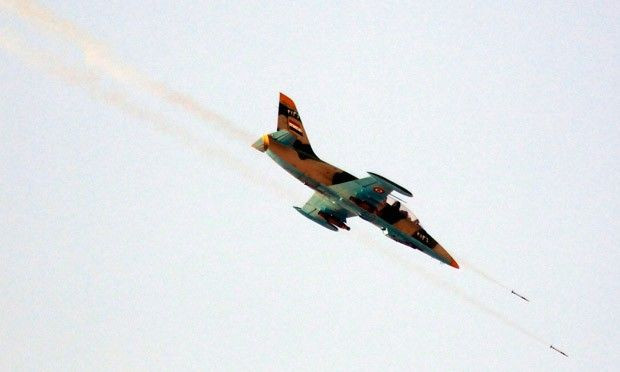Talk Brews Among NATO Allies Of Syrian No-Fly Zone

The West and its allies appear to be taking baby steps toward creating a no-fly zone over Syria -- with the important qualification that it be limited in scope, minimize chances of an open war with Damascus and receive broad international support.
That's a lot of qualifications. But even a limited no-fly zone would already be an important show of support for Syria's opposition forces, including the Free Syrian Army.
On Thursday, France's Defense Minister, Jean-Yves Le Drian, gave a signal that his country would be open to involvement in setting up a partial no-fly zone over Syria.
However, Le Drian noted in an interview to France 24 that a total no-fly zone would amount to a declaration of war, and that "A no-fly zone over all of Syria ... could only be set up if there were an international coalition capable of doing it. For the moment, [that coalition] does not exist."
The minister added that "France is not going to go to war against Syria on its own."
It was in Istanbul, during Hilary Clinton's Aug. 11 visit with Turkish Foreign Minister Ahmet Davutoglu, that the U.S. and Turkey first signaled that they had been considering establishing a Syrian no-fly zone, although they were nowhere near the process that could lead to its enforcement.
Clinton, responding to questions about whether more concrete support would be given to the rebels, including creating safety and no-fly zones in the country, responded that those tasks "need greater in-depth analysis ... you cannot make reasoned decisions without doing intense analysis and operational planning."
The U.S., Turkey and France are the leading military powers in the NATO alliance -- their considerations of imposing a no-fly zone over Syria (even if only a partial one) could be the opening indicator that a broader coalition for intervention is beginning to take rudimentary shape.
Whether more overt military support from the West would ever be approved by the UN Security Council, where Russia and China remain resistant to sanctions or to asking for President Bashar Al-Assad's removal, is doubtful. And Russia, which has been a particularly strong backer for Damascus, is moving in the entirely opposite direction: It announced on Thursday that it was in discussions with Syrian officials on energy, transport and agricultural cooperation.
Le Drian suggested that, in concept, a no-fly area could be set up between the Turkish border and Aleppo, which would stop air strikes on Syria's largest city (one of the Middle East's oldest). The corridor could also protect a pathway for larger amounts of material assistance and weapons to flow to the rebels, which the Syrian government alleges is already taking place with Saudi, Turkish and Western backing.
The French government has been steadfast in requesting the removal of Assad from power and the formation of a new government in Syria. France, Syria's former colonial ruler, currently hosts top Syrian defectors, such as ex-Brigadier General Manaf Tlass (a childhood friend of Assad's) in Paris. Speculation abounds that Tlass is being groomed to be a prominent leader in whatever new government will replace the Assad regime.
Turkey and the U.S. also remain firm in pushing for the departure or voluntary step-down of Assad, once thought of as a way for the Syrian conflict to end peacefully. As fighting continues, concern is rising among Syria watchers that factionalization, introduction of terrorist groups into the country and ethnic fracturing could prolong the conflict even with Assad's absence from the equation.
© Copyright IBTimes 2024. All rights reserved.





















